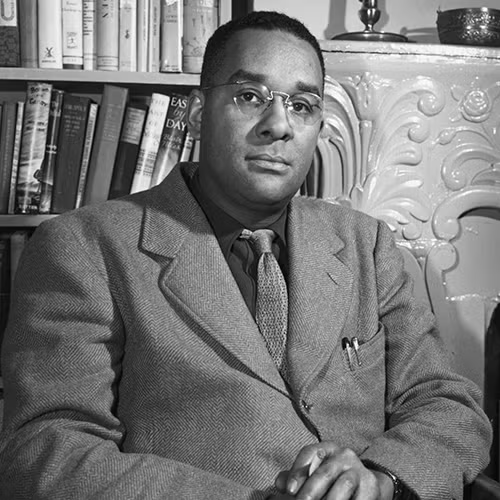
Table of Contents
Who Was Richard Wright?
Richard Wright was a distinguished African American writer and poet, best known for his influential works that highlight the challenges faced by African Americans in a racially segregated society. He published his first short story at the age of 16 and later worked for the Federal Writers’ Project. Wright achieved critical acclaim with Uncle Tom’s Children, a collection of four stories, and cemented his place in literary history with his 1940 bestseller Native Son and his 1945 autobiography Black Boy.
Early Life
Richard Nathaniel Wright was born on September 4, 1908, in Roxie, Mississippi. The grandson of slaves and the son of a sharecropper, Wright’s early years were shaped by the hardships of the rural South. His father abandoned the family when Wright was just five years old, leaving his mother to raise him as a single parent. Wright’s formal education was limited; he attended schools in Jackson, Mississippi, and only completed the ninth grade. However, his passion for literature was evident early on. He became a voracious reader, and at 16, he had his first short story published in a Southern African American newspaper, which marked the beginning of his literary journey.
After leaving school, Wright took on various odd jobs. Despite the obstacles of racial segregation, he was determined to pursue his literary ambitions. He even went so far as to forge notes to borrow books from a white coworker’s library card, as African Americans were prohibited from using public libraries in Memphis. Wright’s desire to understand the world around him grew stronger, and he resolved to escape the oppressive confines of the Jim Crow South. As he confided to a friend, “I want my life to count for something.”
Chicago, New York, and the Communist Party
In 1927, Wright left the South for Chicago, seeking new opportunities and a better life. He found work at the post office and as a street sweeper, but like many Americans during the Great Depression, he struggled with poverty. His dissatisfaction with the capitalist system led him to join the Communist Party in 1932. Despite these challenges, Wright continued to read extensively and write.
In 1937, he moved to New York City, where he hoped his chances of being published would improve. In the bustling literary scene of New York, Wright became involved with the Federal Writers’ Project, an initiative that supported writers during the Depression. This period marked a critical time in Wright’s development as an author, laying the groundwork for his later successes.
Commercial and Critical Successes
Uncle Tom’s Children
In 1938, Richard Wright published Uncle Tom’s Children, a collection of four stories that marked a pivotal moment in his literary career. The work earned him a $500 prize from Story magazine and led to his receiving a prestigious Guggenheim Fellowship in 1939, further solidifying his place in the literary world.
Native Son
Wright’s critical and commercial success continued with the publication of Native Son in 1940. The novel, which tells the story of Bigger Thomas, a 20-year-old African American man, garnered widespread acclaim. It was a bestseller and made Wright one of the most prominent African American authors of the time. Additionally, it became the first book by an African American writer to be selected by the Book-of-the-Month Club. The novel’s success paved the way for a stage adaptation, co-written by Wright and Paul Green, in 1941. Wright also played the lead role in a film version of the story produced in Argentina.
Black Boy
In 1945, Wright released Black Boy, a poignant memoir recounting his childhood and youth in the South. The book offered a powerful narrative of extreme poverty and racial violence, providing an unflinching portrayal of the brutal realities of Black life in America.
Later Years and Career
After living in Mexico from 1940 to 1946, Wright became disillusioned with both the Communist Party and the broader American society. This led him to relocate to Paris, where he spent the remainder of his life as an expatriate. During this period, Wright continued his literary work, publishing novels such as The Outsider (1953) and The Long Dream (1958), along with important nonfiction works like Black Power (1954) and White Man, Listen! (1957).
Wright passed away from a heart attack on November 28, 1960, in Paris. While his naturalistic fiction may not hold the same level of prominence as it once did, his contributions to literature and his life story continue to serve as a powerful example of resilience and artistic achievement.
